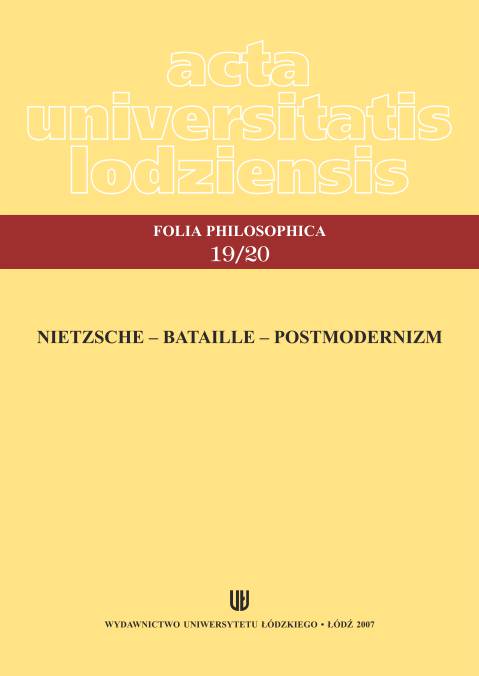Ślady nadczłowieka w doświadczeniu wewnętrznym Georges'a Bataille'a
DOI:
https://doi.org/10.18778/0208-6107.19-20.09Abstrakt
Nietzsche has discovered the origins of Christian metaphysics and identified the dangers caused by its expansion. People have lost the ability to communicate with exterior reality that threatens their culture of well-being, built on metaphysical ideas (the Good, the Beauty, the Truth). In order to avoid nihilism after God's death, humans must regain the ability to communicate with dyonisian reality of sacrum (that is, according to Christian morality, the evil), sacrificed in order to gain Paradise. This is the great task of the "philosophy of the future". The "philosopher of the future" seems to be an overman. Nietzsche and Bataille don't intend to replace the culture of rational entities with the culture of overman. They attempt to repair defects of the human world and restore its lost completion. The main question is: how to recognize the destructive absolute and preserve human identity at the same time? Human as a rational entity perishes while obtaining full knowledge (Nietzsche). The choice is both simple and tragic – to live inside the world of artificial ideas, or to die outside the metaphysical fortress, in the wasteland of full knowledge (sacrum, evil), where there is no God. According to Bataille, inner experience enables temporary reconcilation between the culture of rational entities and the chaos of sacrum. It enables human beings to obtain the full knowledge and survive, for its main "purpose" is to bring into the culture as much sacrum as possible. From this point of view, it appears as a part of the "philosophy of the future" and – in a way – as an appendix to Nietzsche’s lesson of overmanship, for transgressive entity apparently turns out to be a overman.Bibliografia
[Marcel] G. Marcel, Odrzucenie zbawienia i wywyższenie człowieka absurdu, w: tenże, Homo viator. Wstęp do metafizyki nadziei, przeł. P. Lubicz, Warszawa 1959.
Google Scholar
[Matuszewski 1] K. Matuszewski, Vivere mortem, „Tygodnik Literacki” 1991, nr 11.
Google Scholar
[Matuszewski 2] K. Matuszewski, Wstęp do: G. Bataille, Doświadczenie wewnętrzne, przeł. O. Hedemann, Warszawa 1998.
Google Scholar
[Matuszewski 3] K. Matuszewski, Nietzsche/Bataille – impresja, „Nowa Krytyka” 2003, nr 15.
Google Scholar
[Wittgenstein] L. Wittgenstein, Tractatus logico-philosophicus, przeł. B. Wolniewicz, Warszawa 2002.
Google Scholar
DOI: https://doi.org/10.4324/9780203010341
Pobrania
Opublikowane
Jak cytować
Numer
Dział
Licencja

Praca jest udostępniana na licencji Creative Commons Attribution-NonCommercial-NoDerivatives 3.0 Unported License.












